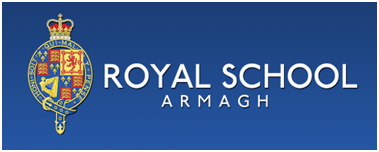The Royal School lies on a historic and beautiful 29 acre campus in the centre of the fine, Georgian, Cathedral City of Armagh. It offers a safe and secure environment with easy access to the island of Ireland’s major arterial routes and airports. It is one of the oldest schools in Ireland, the oldest in Northern Ireland and offers the largest coeducational boarding provision in Northern Ireland. Now into its fifth century its continual existence has borne witness to the turbulent history of these islands. Despite its age, the school’s vision is fixed firmly on the future and on ensuring that the young men and women who come here are equipped for a life of leadership in a world of rapid change.
When the school was granted Letters Patent by His Majesty King Charles I in 1627 it was for the “increase of learning and good manners”, this twin aim of deepening knowledge and building sound character remains to this day. Everything which we aspire to do as a school rests on three pillars: quality, character and care. Each pillar must be strong to ensure that pupils have a meaningful, enjoyable and beneficial time at school.
Quality
High quality academic work and attainment is central to our goal of nurturing the whole person. We encourage pupils to develop intellectual curiosity, to question received wisdoms, to think deeply, to engage with serious subjects across a range of academic disciplines, and to form and articulate their own thoughts. Education has to be much more than merely learning set information, it must fashion our attitude to learning and equip us with the skills to help us go on learning after formal schooling has ended. The metacognitive skills of ‘learning to learn’ are developed through Learning Logs, and a highly effective Assessment for Learning Programme supported by the input of outside agencies.
Our classroom curriculum is challenging, and so we insist on a certain level of academic ability in the pupils we admit. We offer pupils a broad range of learning experiences, and place emphasis on identifying and bringing out the strengths of all pupils, in whatever field, so that they may shine.
The increasing accessibility of information means that educators have a more important role than ever teaching the traditional skills of evaluation, discernment and analysis. The best possible grades at GCSE and A level will pave the way for successful applications to university, but a thirst for understanding and a rigorous approach to study developed at school will be useful throughout life.
Character
Good qualifications might earn you an interview but character is what will sustain you in a job. Our extracurricular and co-curricular programme is vibrant and offers a very wide range of sporting, cultural and musical activities which are designed to stimulate, develop and grow our pupils into rounded young adults.
There is a house system which increases participation possibilities and, in addition, pupils from age 9-18 are encouraged to engage with the tools of positive psychology as articulated through PERMA, the five pillars of sustained well-being and happiness to which they can refer throughout their lives. We believe in offering leadership opportunities and encouraging pupils to try something new – to push themselves outside their comfort zone.
Approximately 15% of the Royal School community are boarders many of whom are foreign nationals. This brings a vibrant international dimension to the school which is treasured by all. The school is also heavily involved in ‘service to others’ at local, national and global level. This fosters and develops the higher order skills of empathy, compassion and altruism.
Care
Pupils must not just be told things and then examined to see how many of them they have remembered – they must be cared for. We unapologetically place care for the individual at the centre of what we do. The School strives to ensure it has high-quality pastoral care, which we aim to ensure is evidenced through routine classroom relationships rather than merely through the correct structures and policies. Highly qualified teachers give extensive support to pupils in a relaxed and open environment.
Our Personalised Learning and Setting Targets Achieving Results (STAR) programmes have been identified as ‘outstanding’ and sector-leading by the Education and Training Inspectorate. Each young person is assessed to establish their ‘baseline’ cognitive ability, staff work closely with pupils to set ambitious targets for attainment, building on that baseline and pupils are then tracked and supported to achieve the best they can. In this way each pupil is compared, not to another pupil – but to themselves. Tracking and support systems aim to help develop bespoke learning programmes which help each pupil to achieve their true potential rather then settle for ‘good enough’.
We believe that pupils must be known and understood as individuals and our heads of year and pastoral team work hard to spend time getting to know them. Our Learning Support is headed by a Special Needs Coordinator assisted by an impressive special needs support team. An effective peer tutoring programme mobilises senior pupils while prefects are assigned to each junior class and are always available to offer assistance. The pupil voice is developed through the School Council and regular pupil focus groups and questionnaires.



